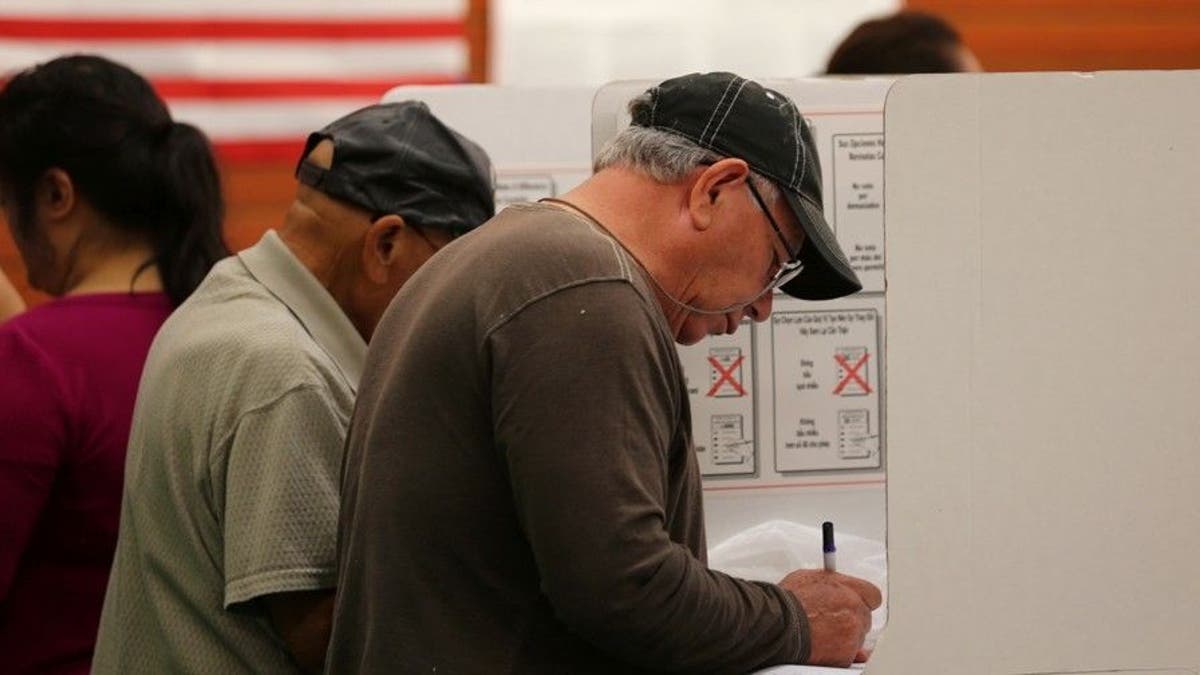
California voters are seen casting ballots in the November 2016 election. California is one of the states where local jurisdictions use 'ranked-choice voting,' something Maine is struggling to implement statewide. (Reuters)
Lawmakers in Maine have decided to postpone a decision on launching a complex and confusing “ranked-choice voting” system for state elections, after struggling to carry out voters’ wishes from a 2016 ballot measure.
In a bill passed Monday, lawmakers opted to push off the process until 2021. The bill will now go to Maine Gov. Paul LePage -- an opponent of the proposed system -- who has 10 days to sign, veto or do nothing and allow the bill to become law.
The ballot measure, which passed by 52 percent in November, had caused mass confusion in the state. The ranked-choice voting system (RCV) originally was slated to go into effect ahead of the 2018 primary elections, which would have made Maine the first state in the nation to implement RCV.
RCV works like this:
- In races with three or more candidates, voters rank their choices.
- If no candidate gets more than 50 percent of first-ranked votes, the candidate with the fewest ‘number one’ rankings is eliminated.
- Ballots that had ranked the eliminated candidate as the top choice are then assigned to their second choice, with the process repeating until one candidate has a majority of votes.
The system is not only complicated but legally problematic.
In May, the Maine State Superior Judicial Court issued an advisory opinion saying that ranked-choice voting would violate the state constitution, which requires electoral winners to be decided by a “plurality.” However, this would only apply to state-level elections, not federal ones; the law involves voting for both. The court said the state could vote to repeal the law or work on introducing a constitutional amendment to allow for it.
The bill passed Monday says Maine can repeal the ranked-choice voting system entirely if no amendment to the state constitution is made to allow for it by December of 2021, the Portland Press Herald reports.
MAINE STRUGGLES TO LAUNCH FIRST STATEWIDE 'RANKED-CHOICE VOTING' SYSTEM
The state legislature made several attempts earlier this year to figure out whether to implement the system, including a failed proposal for a constitutional amendment. The Veterans and Legal Affairs Committee held a public hearing last week on a bill to implement the parts of the law that did not violate the constitution while delaying others, but failed to reach a consensus.
Supporters of RCV say the state’s punt goes against what voters want.
“People caved to undermine the will of the people, it’s a sad day for our democracy, it’s a sad day for the state of Maine. But we are not finished, we are not going to stop fighting,” Kyle Bailey, a spokesman for the Committee on Ranked Choice Voting, told the Press Herald.
Voters could still fight back at the postponement, however, if they’re able to gather enough signatures in opposition to the bill.




